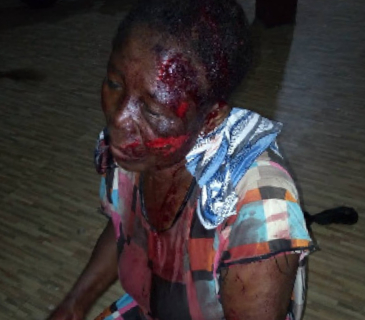Last month there was a national uproar following the ruthless lynching to death of Akua Denteh, 90 at Kafaba in the Savannah Region.
According to reports, a fetish priest accused her of witchcraft in the same region
So far, all seven accused persons, including the self-styled traditional priestess, one Sirina Mohammed who allegedly played a role in the murder of the 90-year-old have been put before court for the law to take its due course.
Even as the country is currently trying to raise her head above the shame and public condemnation the Kafaba indecent brought on us, another similar indecent has popped up.
This time around a woman in her late 50s has sustained severe injuries to her skull after being attacked at Sumpini in the West Gonja District of the Savanna Region.
From reports, the attack on Maria Ibrahim happened after the Bugum festival on Saturday evening when a group of men accused her of witchcraft.
A girl who lives with the woman and her sick husband was also attacked.
The accused is reported to have told a health worker treating her at the West Gonja District Hospital in Damango that a young man on the same compound fell sick and she was accused of being behind his illness.
‘Although I denied it, they pursued and attacked me with machetes,’ she said.
The paper unreservedly condemns this barbaric act more especially coming from the same region in just a matter of weeks after the Akua Denteh incident.
The only signal this new case gives us is that we are not learning as a nation.
THE NEW PUBLISHER holds that there appears to be lack of political will to tackle the problem head on. Hence the scourge of witch hunting continues to ravage many communities and witch camps continue to proliferate in the region.
It is an open secret that most cases of witchcraft accusation take place in remote villages where local chiefs and elders, chief priests and soothsayers wield a lot of influence.
It is also true that witchcraft accusation is often a cover for many social problems like ignorance, envy, jealousy, struggle for scarce resources, frustration, desperation and greed, sickness and diseases, family disputes, rivalry, hatred and gender injustice
As a result, these alleged witches are often made scapegoats particularly in communities where any instance of evil and misfortune is often believed to be caused by human beings through magical means.
While the Paper believes the culprits in this new case would be arrested and brought to book as in the Akua Denteh case, we are hopeful that the outcome of the prosecution would send the right message to the perpetrators of this dastardly act.
These isolated cases of abuse on women in the name of witchcraft must be closely looked at by the government and its allied agencies.


Comments are closed.